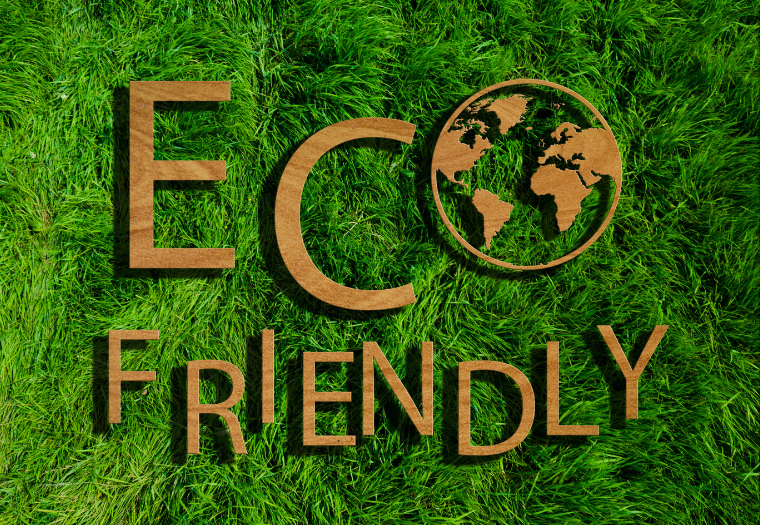 IDEIA is proud of its environmental consciousness and the implementation of innovative technologies aimed at minimizing harm to the environment. One of the ways to reduce ecological risks is through the use of recycled materials in textile production.
IDEIA is proud of its environmental consciousness and the implementation of innovative technologies aimed at minimizing harm to the environment. One of the ways to reduce ecological risks is through the use of recycled materials in textile production.
IDEIA fabrics, made from polyester fiber, are an excellent example of environmental responsibility. This material, obtained from the recycling of plastic bottles, has a low carbon footprint and significant potential for reducing environmental impact.
The use of recycled plastic in IDEIA fabrics offers numerous environmental advantages:
- It reduces the consumption of new materials and helps prevent waste accumulation in nature. We contribute to creating a closed recycling loop where waste materials are transformed into high-quality textile products.
- It decreases energy consumption and greenhouse gas emissions compared to the production of textile materials from petroleum-based raw materials. This allows us to reduce our carbon footprint and contribute to restoring environmental balance.
IDEIA recognizes the importance of conscious consumption and aims to encourage customers to make informed choices when purchasing textile products. We strive to provide high-quality textile materials that maintain their quality over time and support ecological balance.
Everyone can contribute to creating a more stable and environmentally friendly world. The path to change begins with conscious choices and support for products that contribute to nature preservation.
What Does Eco-Friendly Mean?
Eco-friendly is a term that describes products, processes, and materials designed with minimal negative impact on the environment. In modern textile production, an eco-friendly approach is applied to create environmentally safe materials that minimize the use of resources, energy, chemicals, and reduce emissions and waste.
The textile industry employs several methods to achieve eco-friendly results. Some of them include using recycled materials, such as recycled polyester obtained from plastic bottle recycling, and recycled cotton derived from textile industry waste. This helps reduce the consumption of new raw materials and decrease the amount of waste going to landfills.
Other methods involve the use of eco-friendly dyes and finishes, water-efficient and energy-efficient production technologies, as well as waste management and recycling systems.
Purchasing eco-friendly textile products allows consumers to contribute to environmental conservation. They can be confident that the chosen goods are produced in compliance with high standards of ecological sustainability and do not harm the planet.
The Importance of Eco-Friendly Textiles
Eco-friendly textiles play a crucial role in the modern world by contributing to:
- Environmental preservation: Traditional textile production can have a significant negative environmental impact. Using eco-friendly materials and processes helps reduce the consumption of natural resources, water, and energy, as well as decrease emissions of pollutants and waste into the environment.
- Air pollution reduction: Traditional textile treatment and finishing methods may involve the use of chemicals that are released into the atmosphere and contribute to air pollution. Eco-friendly textiles strive to minimize the use of such substances or replace them with safe alternatives, thereby improving air quality.
- Human health: Textile products made with chemical substances can contain traces of toxic elements that can be harmful to human health. Eco-friendly textiles aim to minimize such risks and ensure consumer safety.
Overall, eco-friendly textiles play a vital role in sustainable development and the preservation of natural resources for future generations. They contribute to creating a healthier and environmentally friendly planet where people and nature can coexist harmoniously.
What You Gain by Choosing Eco-Friendly Textiles
By opting for eco-friendly textiles, you gain several significant advantages that can outweigh certain drawbacks. Here's why choosing eco-friendly textiles matters:
- Environmental conservation: Eco-friendly textiles are made from environmentally safe materials and utilize production processes that minimize negative impacts on the environment. By choosing eco-friendly textiles, you actively contribute to preserving natural resources and reducing emissions of harmful substances.
- Health and safety: Eco-friendly textiles typically do not contain toxic chemicals such as pesticides, formaldehyde, or heavy metals. This means they are safe for your health and do not cause allergic reactions or skin irritations. Additionally, some eco-friendly textile materials possess natural antibacterial and hypoallergenic properties.
- Sustainability and durability: While eco-friendly textiles may be less resistant to wear compared to some traditional materials, high-quality eco-friendly products still exhibit good strength and durability. They can serve you well for many years.
- Innovation in design and style: Modern eco-friendly textile manufacturers offer a wide range of fashionable and stylish designs. You can find eco-friendly textiles in various textures, colors, and patterns that accentuate your individual style and allow you to express your creative nature.
Choosing eco-friendly textiles allows you to blend style, comfort, and care for the planet. It is an investment in the health, environment, and future of generations to come.
Read about the ecological lifestyle HERE.
